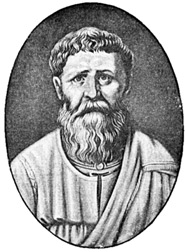A colossus bestriding two worlds
 Most philosophers are strange people. Greek philosopher Diogenes
lived in a barrel like a dog. In fact, he was called “The Dog.” Socrates
drank a cup of hemlock to honour the country’s laws. He refused to run
away from the prison when some of his well-wishers volunteered to bribe
the jailers and secure his release. Similarly, Aurelius Augustine
(354-430 AD) upheld the Greek philosophical view that logic could unlock
the keys to the universe. However, after some time, he contradicted
himself by saying that faith was more important than reason. This he did
after embracing Christianity. Most philosophers are strange people. Greek philosopher Diogenes
lived in a barrel like a dog. In fact, he was called “The Dog.” Socrates
drank a cup of hemlock to honour the country’s laws. He refused to run
away from the prison when some of his well-wishers volunteered to bribe
the jailers and secure his release. Similarly, Aurelius Augustine
(354-430 AD) upheld the Greek philosophical view that logic could unlock
the keys to the universe. However, after some time, he contradicted
himself by saying that faith was more important than reason. This he did
after embracing Christianity.
According to Christian theology, man and everything in the universe
are created by God. Humans are corrupt and ignorant creatures who
inhabit the earth. After this life, those who commit sin will suffer in
hell and others who do good deeds will live happily in heaven.
An all-powerful loving God is always there to redeem mankind. Thus
Christian theologists place more emphasis on faith in God than reason.
Faith can move mountains, as the saying goes. Even the great physicist
Albert Einstein said, “God does not play dice with the universe.”
Study of God
In the Middle Ages, most philosophers turned to the study of God from
the study of man. They studied theology to unravel the mystery of man
and the universe. In the process they confronted many questions: Can man
understand God through reason? Can a Christian question the concept of
God? The first Christians were not interested in the classical view of
life expressed by Greek philosophers. Gradually, Christian doctrine
increased in complexity.
Aurelius Augustine tried to synthesise the Christian theology with
Platonic philosophy. In the process, he was caught between two worlds.
His mother, Monica, who was a devout Christian influenced him to embrace
Christianity. However, he found that something was missing in his life.
Then he tried to satisfy his bodily desires such as sex.
|

Aurelius Augustine: What maketh the heart of the Christian
heavy? The fact that he is a pilgrim, and longs for his own
country. |
He said that in his tender youth love and lust seethed within him.
Under the influence of his mother he started reading the Bible and the
first part he read seemed written just for him: “Let us behave with
decency as befits the day; no drunken orgies, no debauchery or vice, no
quarrels or jealousies!”
Augustinian Order
Augustine was baptised in Milan. He sold his inheritance, helped the
poor and founded the Augustinian Order, supposed to be the oldest
Christian monastic order in the West. After becoming a Bishop, he
challenged non-believers to public debates. He wrote a number of
treatises including the Confessions and the City of God. Before his
death, he wrote his own epitaph: “What maketh the heart of the Christian
heavy? The fact that he is a pilgrim, and longs for his own country.”
After embracing Christianity, Augustine rejected Greek philosophical
concepts such as Platonism, Epicureanism and Stoicism. He said that
faith was a prerequisite for any philosophical inquiry. He believed that
reason was dangerous without faith in God. On more than one occasion he
ridiculed Greek philosophy.
Augustine firmly believed that it was only through faith that wisdom
could be attained. According to him, religion or philosophy were quests
for finding the truth. the philosopher without faith could never find
the ultimate truth. He said, “Unless thou believe thou shalt not
understand.”
Conversion
As a youth, Augustine renounced religion but after his conversion to
Christianity he realised that faith was the forerunner to everything. In
reply to his detractors Augustine said all men were born in sin and they
were sinners. However, a redemption is possible by the grace of God
irrespective of what we do on earth.
In recent times, leading philosopher Wittgenstein paid a compliment
to Augustine’s Confessions, not for its religious or even philosophical
pronouncements, but for the way in which Augustine describes the
learning of language: “When my elders named some objects and accordingly
moved towards something, I saw this and I grasped that the thing was
called by the sound they uttered when they meant to point it out.”
Augustine will be remembered as a colossus bestriding two worlds. |

